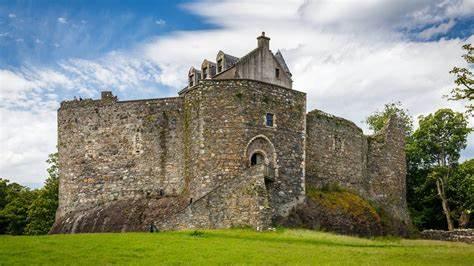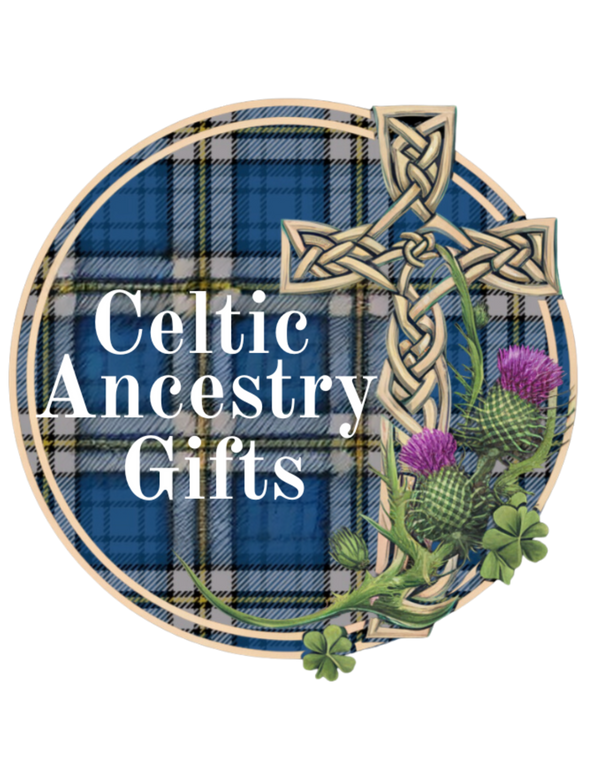
Clan MacDougall: Guardians of Lorn & Legacy of Somerled
Share
1️⃣ Introduction: Pride in a Name Rooted in Legend
To bear the name MacDougall (or MacDougal, McDougall, McDougal) is to hold a fragment of the Highlands within your very name — a song of sea spray, ancient courage, and enduring pride. The Gaelic form, Mac Dhughaill, means “son of Dougal,” itself derived from Dubhghall, meaning “dark stranger.”
The name reaches back to a time when Norse-Gaelic chieftains ruled the western seas, when bloodlines and loyalty determined kingdoms, and when courage alone carved the future. Those who claim descent from Clan MacDougall trace their lineage to one of Scotland’s most powerful and romantic ancestors — Somerled, Lord of the Isles, whose children divided his dominion between the Hebrides and the mainland of Argyll.
To speak of Clan MacDougall, then, is to speak of a family that once ruled Lorn, commanded the western sea-lanes, and bore witness to Scotland’s defining struggles for freedom and unity.
2️⃣ History & Origins: From Somerled to the Lords of Lorn
From Somerled’s Sons to the Birth of a Clan
Somerled, the mighty warrior-king who died in 1164, was part Norse and part Gaelic, embodying the very fusion of cultures that shaped medieval Scotland. His eldest son, Dougall, inherited the mainland territories of Argyll and Lorn, becoming the progenitor of Clan MacDougall — Clann Dhughaill — “the children of Dougal.”
Dougall’s descendants established their seat of power around Dunollie, overlooking the Sound of Kerrera, and ruled much of what is now modern-day Argyll. By the 13th century, the MacDougalls were among the most influential of all Highland families, with maritime influence stretching deep into the Hebrides and mainland estates extending into Glen Etive and beyond.
The MacDougalls in the Wars of Independence
In the late 13th and early 14th centuries, the MacDougalls reached their zenith — and faced their greatest trials. Their fortunes became entangled with the fate of Scotland itself during the Wars of Independence.
The MacDougalls were allied by marriage to the powerful Comyn family, rivals to Robert the Bruce. When Bruce slew John “the Red” Comyn in 1306, the MacDougalls stood against him. Battles flared between the two sides across Argyll, culminating in the famous Battle of the Pass of Brander, where Bruce’s forces routed the MacDougalls.
During this campaign, the MacDougalls captured a precious heirloom from the Bruce family — the Brooch of Lorn, a relic still treasured in clan lore. Though they later lost much of their power, their spirit remained unbroken. The clan motto — “Buaidh No Bas”, meaning “Victory or Death” — perfectly captured their defiance.
Loss and Renewal
Despite the fall from royal favour, later kings recognized the MacDougalls’ historic loyalty to Scotland’s cause. King David II restored portions of their ancestral lands, including their holdings in Lorn, allowing the family to rebuild around Dunollie. By the 15th century, they stood once again among the respected Highland families, though their power was now more local than regal.
3️⃣ Spelling Variations & Connections to Other Names
Like all Gaelic surnames, the MacDougall name has evolved across centuries and continents. Variations reflect regional pronunciation, anglicization, and the migrations of families seeking new lives abroad.
Variants: MacDougall, MacDougal, McDougall, McDougal, MacDouall, MacDugal, MacDugald
Gaelic Form: Mac Dhughaill (“son of Dougal”)
Septs and Related Names: Dougal, Dugald, Dowall, MacDowall, McDowell, MacDowal
Allied Clans: Historically allied or connected through marriage and geography with the MacDonalds, MacRuaries, and Comyns; often at odds with the rising Campbells of Argyll.
Though written in many ways, each form shares the same ancient root — a bond of blood stretching back to Somerled himself.
4️⃣ Landmarks & Regions Associated with Clan MacDougall
Few clans are as inseparably tied to place as the MacDougalls are to Lorn and Argyll. The very stones of the coast still whisper their name.
Dunollie Castle — The ancient seat of Clan MacDougall stands proudly on a rocky promontory overlooking Oban Bay. From this stronghold, the MacDougall chiefs ruled the lands of Lorn and guarded the vital sea routes through the Inner Hebrides. Though now a romantic ruin, Dunollie remains a symbol of clan endurance and pride.
Dunstaffnage Castle — Once a royal fortress, Dunstaffnage was at times held by branches of the MacDougalls and their kin. It served as a key stronghold in the medieval contest for the western seaboard.
The Battle of Red Ford (Ath Dearg) — Near Loch Awe, the MacDougalls clashed with the Campbells in one of the bloodiest battles of the 13th century, defending their ancestral claims in Lorn. Victory was theirs that day, though it marked the beginning of centuries of rivalry between the two great Argyll clans.
From Glen Etive’s misty glens to the windswept coastlines of Mull and Kerrera, MacDougall history lies etched into every stone and shore of the western Highlands.
5️⃣ Migration & Modern-Day Presence
The decline of the clan system, the Jacobite risings, and later the Highland Clearances scattered the MacDougalls far from their homeland. Yet wherever they went — across the Atlantic to Nova Scotia, the Carolinas, Australia, and New Zealand — they carried their heritage with them.
In the Jacobite era, many MacDougalls fought for the Stuart cause. During the 1715 Rising, they were among those who took up arms at Sheriffmuir, standing steadfast for the old line of kings. Though not centrally involved in the 1745 Rising, many clan members still joined the Highland army, carrying their banner and motto with honour.
By the 19th century, emigration became a matter of survival. Entire families of MacDougalls crossed the sea, establishing new communities that kept the Gaelic spirit alive. Today, the name flourishes around the world, with active clan societies ensuring that the proud story of the Lords of Lorn continues to inspire future generations.
The present chief of Clan MacDougall — Morag Morley MacDougall of MacDougall and Dunollie — continues the unbroken line of descent from Somerled, safeguarding the family’s heritage and the preservation of Dunollie’s historic legacy.
6️⃣ Fun Fact: The Brooch of Lorn
One of Scotland’s most famous relics, the Brooch of Lorn, is said to have been torn from Robert the Bruce’s cloak by a MacDougall warrior during the Battle of Dalrigh in 1306. Though its exact origins are debated, it remains a treasured emblem of the clan’s ancient role in Scotland’s most dramatic history.
Its story weaves together themes of courage, rivalry, and resilience — qualities that have always defined the MacDougall name.
💚 Search your family name in the search bar above to explore your clan gifts.
Discover MacDougall pride on mugs, t-shirts, blankets, ornaments, wall art, phone cases, magnets, flags, and more — perfect keepsakes for every proud descendant of the Lords of Lorn.
